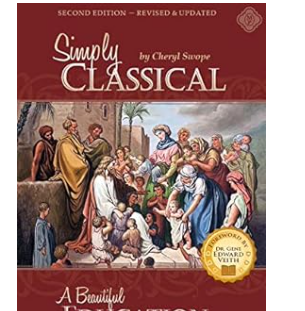Kathy Kuhl’s review of Cheryl Swope’s Simply Classical

by Kathy Kuhl Review of Cheryl Swope’s revised book, Simply Classical: A Beautiful Education for Any Child
When you hear “classical education,” what comes to mind? Academic rigor your child couldn’t handle? Homeschool moms frantically learning Latin so they can teach their children declensions? Little kids in togas made of old sheets?
Since my son struggled to learn to read English, I never considered classical education. If Cheryl Swope’s book had been written then, I could have given the approach serious consideration. Simply Classical: A Beautiful Education for Every Child explains what classical education is and how it can be adapted for a child with special needs.

I should note that this book specifically explores classical Christian education. Though she discusses her beliefs and the spiritual instruction of her children, her work would help any parent of a struggling learner because it is well organized and practical.
What Classical Education Is
It’s not just about Latin, Greek, and the ancient world.
Classical education teaches students to appreciate the good, the true, and the beautiful. Its goal is to develop talents of students and produce useful citizens.
From this author’s perspective, Christian classical education also means:
• seeing and honoring God as the ultimate source and example of goodness, truth, and beauty,
• recognizing the worth of each person, regardless of ability, as being made in the image of God, and
• helping each student develop his or her gifts for God’s glory.
As Cheryl Swope writes, “Classical education will not remove a child’s challenges. Classical education simply provides a means by which the child can be educated—truly educated—in spite of his or her challenges.” (p. 83.)
How’s that working out for you?
Before say “Sounds like too much work with my child,” consider how Cheryl Swope successfully homeschooled two children with significant disabilities, and achieved extraordinary results.
Adopted at age 13 months, twins Michelle and Michael were said to be “delayed.” While each child faced different “profound mental, emotional, developmental, and physical difficulties,” their parents’ decision to educate them classically gave these children opportunities to develop in unexpected ways. To quote from Gene Edward Veith’s preface:
We see the study of logic helping Michael to organize his own thoughts, and we see the study of Latin helping Michelle realize what she can do with words. We see Michael turning his love of history into a job with a museum and Michelle discovering opera…. what is sometimes forgotten or never mentioned about classical education: how profoundly human and humanizing it is.
That is in stark contrast to the way special education is often carried out. Most educational programs for special-needs children limit themselves to training for “practical” living. (P. 11)
To put it in terms of labels and test scores, take Michelle, who was diagnosed with a developmental disability (full scale IQ of 75), and a dozen other diagnoses. After years of classical education at home, at the beginning of eighth grade, Michelle scored two years above grade level in oral comprehension, three years ahead in academic knowledge and writing fluency, 1-5 months ahead in reading fluency and phonetics skills, and at a post secondary level in oral expression. (P. 82) Similarly, Michael made great strides.
The author shows how the classical approach honors the humanity of children with special needs by not denying them time to study poetry, the arts, history, and literature. Simply Classical also provides practical help in many areas:
- A thorough chapter on evaluations
- 3 chapters on modifying materials
- 4 appendices of resources on special education, classical education, support groups, and materials for specific subjects.
Who should buy this book?
If you are using or considering a classical approach to your homeschool, if you have a child with special needs and you are looking for enrichment ideas, or if you just want to understand classical education or special education at home better, I recommend this book.
If you purchase this book from a link on this page, part of your purchase will support the work of LearnDifferently.com. Thank you.


2 Comments